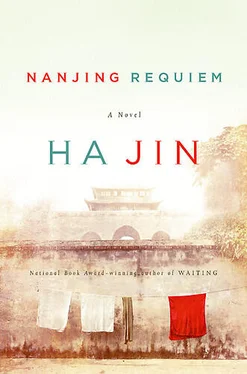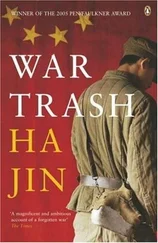There had been shelling in the south, where even the skyline seemed to be jumping with ruddy-edged clouds. Fighting had been going on outside the city since the previous day. It was said that the New Fourth Army, the Communist force liked by the country people because of its strong discipline, was active within ten miles of Nanjing and had been exchanging fire with the Japanese. That afternoon three truckloads of wounded soldiers had been brought back into the city. We’d also heard that many Japanese women and children were leaving Nanjing, which might herald something ominous for the occupiers. Rumor had it that the Japanese military was about to abandon the city, but none of us believed that this would happen.
That evening we visited Mrs. Dennison. We found her in a buoyant mood, and she received us warmly. Seated on a leather sofa, I looked around, admiring the bright, spacious living room. There was carved furniture, and a tall Ming vase stood beside the door. The floor was glossy, just waxed, and the built-in bookshelves, freshly painted, still held hundreds of Eva’s books. What a splendid place for entertaining friends. Mrs. Dennison was so lucky. I glanced at Minnie, who must have been nettled by envy. She avoided eye contact with the old woman.
I wondered if Mrs. Dennison had planned to move in all along. Had Eva said she could use this house as well? Unlikely. A careful person, Eva wouldn’t have made such a blunder. Should I tell the old woman that Eva had promised the bungalow to Minnie? What was the good of that? Minnie couldn’t possibly chase Mrs. Dennison and Aifeng out. God willing, I hoped they might soon find this place lonesome and too far from everything and might move back to their apartment. Nothing could be done for now.
Minnie remained quiet for the whole visit, while the old woman talked at length about the Rockefeller family. Despite the lethargic stock market in the States, they had just promised to donate more to our college once the war was over. But when would that be?
Mrs. Dennison was so pleased with her new residence that she began to host dinners a few times a week and always invited Minnie. Minnie was grateful at first, but soon she told me that the old woman might be utilizing her popularity to draw visitors. No wonder Mrs. Dennison appeared so friendly to her in front of the guests. The old woman’s dinners began to feel more and more onerous to Minnie, who was increasingly chafing under Mrs. Dennison’s continual interventions.
In early June Mr. Morrison of the United Christian Missionary Society approached Minnie and proposed that she return to the States to serve as the vice president of their organization, in charge of education.
“What do you think I should do?” she asked me.
“I would accept it if I were you.”
“It’s hard for me to leave.”
“A boat missed may never come again.”
She gave it serious thought for some days — it was an opportunity to disentangle herself from the mess here. Though she would still supervise a good number of missionary schools in China, she feared that it would distance her from Jinling. The previous summer another job had been offered her as well — to work on Jinling’s executive committee in New York, and although she’d declined, her friend Rebecca Griest had written that the position wasn’t filled yet. So New York could be another option for Minnie. She would love to use the libraries at Columbia again, for which she still had an alumni card. She had earned her master’s in school administration from that university’s Teachers College.
After long consideration, she decided to stay, saying she couldn’t possibly abandon Jinling, especially the six hundred poor women in the Homecraft School who regarded her as their protector. Jinling had become her home and China her adopted homeland. She wrote back to Mr. Morrison, stating that she didn’t have the training and experience for such a consequential position; that her departure from Jinling would put more burden on Dr. Wu’s shoulders, which she would never allow to happen; that a younger and more energetic person would likely be more suitable for the job, since the society needed new blood; and that, above all, she ought to remain here in China’s hour of trials. In short, she simply couldn’t cut her losses and leave. She showed me her letter and also the reply from Mr. Morrison, who wrote that he understood Minnie’s decision and was full of admiration.
As the summer vacation was approaching, some faculty members planned to go elsewhere to escape the sweltering heat. From Aifeng, we learned that she and Mrs. Dennison were leaving for Shanghai soon, and from there they would travel north by ship to a beach resort on Bohai Bay. This news gladdened Minnie, because she believed that once they left, she’d be able to live in Eva’s bungalow for the rest of the summer.
It rained on and off for a whole night — enough to revive the withered shrubs and flowers on campus, but not enough to flood the paddies so rice seedlings could be planted, which should have been done two months before. Farmers had been having a tough time this spring. Besides the drought, the turmoil of the war still persisted. During the day many Japanese planes flew by to drop bombs outside the city. It was said that the guerrillas had been active in the vicinity of Nanjing, but the Japanese were determined to keep them away. For a whole week gunfire could be heard in the south.
Mrs. Dennison and Aifeng left a few days later, together with Ban. The boy had never been to Shanghai, so Mrs. Dennison, who was childless, wanted him to visit the metropolis. She was fond of him, having seen him grow up.
On the same day they left, Minnie moved into Eva’s bungalow. She was excited to have the entire house to herself now, but when I went to see her the next evening, she said the place felt somewhat isolated. She wasn’t sure she would like it.
TO OUR ASTONISHMENT, Mrs. Dennison came back with Ban a week later. Her return embarrassed Minnie, and yet it would be humiliating to move out of the bungalow right away.
Though flustered, Minnie decided to stay in the house with Mrs. Dennison in Aifeng’s absence. Aifeng had gone alone to the beach resort in the north to meet her fiancé there. Mrs. Dennison showed no sign of resentment and only told us, “There’s so much to do here that I’d better not leave — I won’t have a summer vacation anymore. I’m used to the heat here anyway.” She still had her personal possessions in the bungalow and hardly needed to unpack.
Minnie soon realized that she couldn’t possibly live under the same roof with the old woman for the whole summer, sharing breakfast and supper with her every day, so Minnie applied for a permit from the city’s travel office.
The permit arrived the following week. Minnie decided to go to Tsingtao by way of Shanghai, because it would be easier to travel by boat from there. We all were surprised by her sudden decision to spend the summer elsewhere. Rulian decided to give her a picnic send-off at the poultry center and invited seven other young faculty members and me. The main course was zongzi , pyramid-shaped dumplings made of glutinous rice, dates, peanuts, and ham. There were also steamed shrimp, sautéed vegetables, and fresh dates. Minnie loved zongzi and peeled away the reed leaves, which were wrapped around the rice to give it an herby aroma, but she wouldn’t dip it into a plate of brown sugar as we did. She said she liked the natural flavor better. In the center of the table stood a glass jar holding daisies mixed with young dog-tail grass. The flowers were delicate and fluffy, each displaying a disk of white petals that surrounded a golden heart, and they gave off a faint fragrance. Rulian had thoughtfully asked Old Liao to cut a bunch.
Читать дальше











